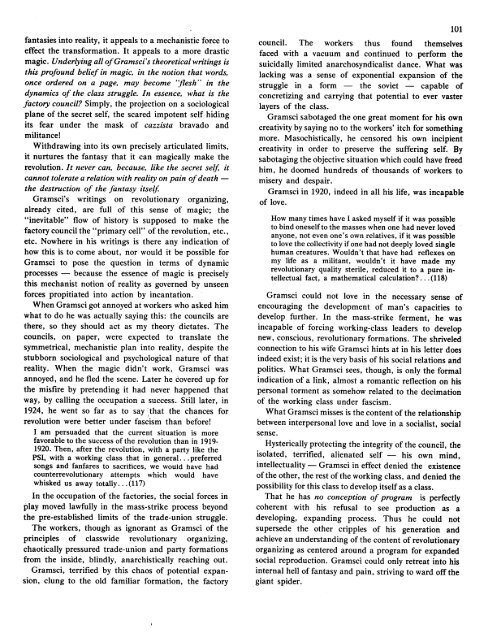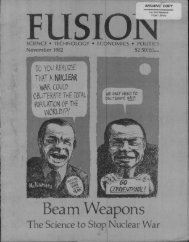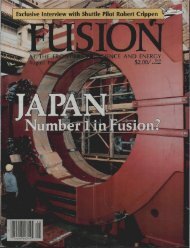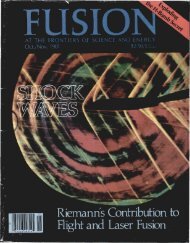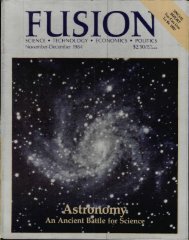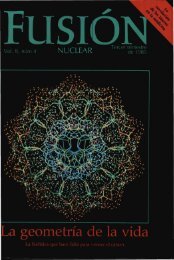The Campaigner
The Campaigner
The Campaigner
Create successful ePaper yourself
Turn your PDF publications into a flip-book with our unique Google optimized e-Paper software.
fantasies into reality, it appeals to a mechanistic force to council. <strong>The</strong> workers thus found themselves<br />
effect the transformation. It appeals to a more drastic faced with a vacuum and continued to perform the<br />
magic. Underlying all of Gramsci's theoretical writings is suicidally limited anarchosyndicalist dance. What was<br />
this profound belief in magic, in the notion that words, lacking was a sense of exponential expansion of the<br />
once ordered on a page, may become "flesh" in the struggle in a form the soviet capable of<br />
dynamics of the class struggle. In essence, what is the concretizing and carrying that potential to ever vaster<br />
factory council? Simply, the projection on a sociological layers of the class.<br />
plane of the secret self, the scared impotent self hiding Gramsci sabotaged the one great moment for his own<br />
its fear under the mask of cazzista bravado and creativity by saying no to the workers' itch for something<br />
militance! more. Masochistically, he censored his own incipient<br />
Withdrawing into its own precisely articulated limits, creativity in order to preserve the suffering self. By<br />
it nurtures the fantasy that it can magically make the sabotaging the objective situation which could have freed<br />
revolution. It never can, because, like the secret self, it him, he doomed hundreds of thousands of workers to<br />
cannot tolerate a relation with reality on pain of death -- misery and despair.<br />
the destruction of the fantasy itself. Gramsci in 1920, indeed in all his life, was incapable<br />
Gramsci's writings on revolutionary organizing, of love.<br />
already cited, are full of this sense of magic; the<br />
"inevitable" flow of history is supposed to make the How many times have I asked myself if it was possible<br />
to bind oneself to the masses when one had never loved<br />
factory council the "primary cell" of the revolution, etc.,<br />
anyone, not even one's own relatives, if it was possible<br />
etc. Nowhere in his writings is there any indication of to lovethecollectivityifonehadnot deeply loved single<br />
how this is to come about, nor would it be possible for human creatures. Wouldn't that have had reflexes on<br />
Gramsci to pose the question in terms of dynamic my life as a militant, wouldn't it have made my<br />
revolutionary quality sterile, reduced it to a pure inprocesses<br />
because the essence of magic is precisely tellectual fact, a mathematical calculation?...(118)<br />
this mechanist notion of reality as governed by unseen<br />
forces propitiated into action by incantation. Gramsci could not love in the necessary sense of<br />
When Gramsci got annoyed at workers who asked him encouraging the development of man's capacities to<br />
what to do he was actually saying this: the councils are develop further. In the mass-strike ferment, he was<br />
there, so they should act as my theory dictates. <strong>The</strong> incapable of forcing working-class leaders to develop<br />
councils, on paper, were expected to translate the new, conscious, revolutionary formations. <strong>The</strong> shriveled<br />
symmetrical, mechanistic plan into reality, despite the connection to his wife Gramsci hints at in his letter does<br />
stubborn sociological and psychological nature of that indeed exist; it is the very basis of his social relations and<br />
reality. When the magic didn't work, Gramsci was politics. What Gramsci sees, though, is only the formal<br />
annoyed, and he fled the scene. Later he covered up for indication of a link, almost a romantic reflection on his<br />
the misfire by pretending it had never happened that personal torment as somehow related to the decimation<br />
way, by calling the occupation a success. Still later, in of the working class under fascism.<br />
1924, he went so far as to say that the chances for What Gramscimisses is the content of the relationship<br />
revolution were better under fascism than before! between interpersonal love and love in a socialist, social<br />
I am persuaded that the current situation is more sense.<br />
favorable to the success of the revolution than in 1919- Hysterically protecting the integrity of the council, the<br />
1920. <strong>The</strong>n, after the revolution, with a party like the<br />
PSI, with a working class that in general...preferred isolated, terrified, alienated self -- his own mind,<br />
songs and fanfares to sacritices, we would have had intellectuality -- Gramsci in effect denied the existence<br />
counterrevolutionary attempts which would have of the other, the rest of the working class, and denied the<br />
whisked us away totally... (117) possibility for this class to develop itself as a class.<br />
In the occupation of the factories, the social forces in That he has no conception of program is perfectly<br />
play moved lawfully in the mass-strike process beyond coherent with his refusal to see production as a<br />
the pre-established limits of the trade-union struggle, developing, expanding process. Thus he could not<br />
<strong>The</strong> workers, though as ignorant as Gramsci of the supersede the other cripples of his generation and<br />
principles of classwide revolutionary organizing, achieve an understanding of the content of revolutionary<br />
chaotically pressured trade-union and party formations organizing as centered around a program for expanded<br />
from the inside, blindly, anarchistically reaching out. social reproduction. Gramsci could only retreat into his<br />
Gramsci, terrified by this chaos of potential expan- internal hell of fantasy and pain, striving to ward off the<br />
sion, clung to the old familiar formation, the factory giant spider.<br />
101


